Money
LaVere Redfield, the Silver Dollar King
One of history's more-eccentric rich guys.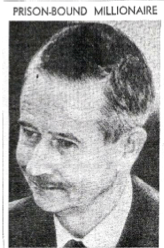
Brief essay here.
An outstanding incident from his life.
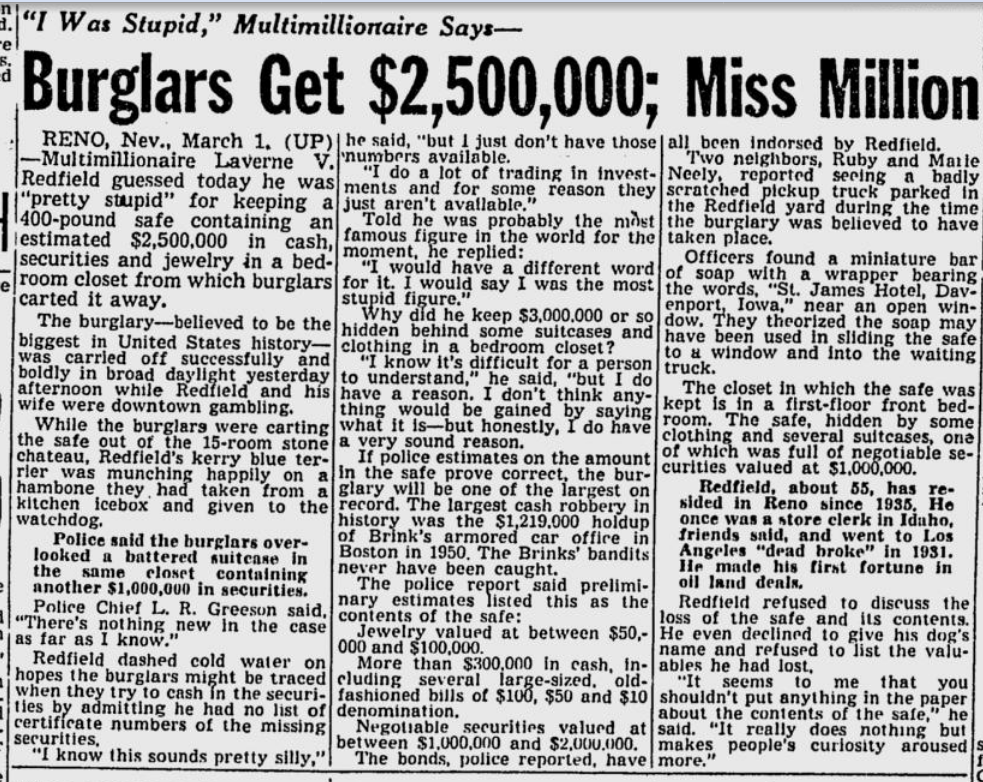
Source of article.
Posted By: Paul - Wed Aug 30, 2017 -
Comments (1)
Category: Eccentrics, Money, 1950s
The Life and Death of 9413
Posted By: Paul - Thu Jun 22, 2017 -
Comments (4)
Category: Body Modifications, Culture and Civilization, Money, Movies, Surrealism, 1920s
The Shabby Millionaire
1989: John Barrier of Spokane, Washington went into Old National Bank to cash a $100 check. Then he asked to have his 60-cent parking ticket validated. The cashier refused, saying that merely cashing a check didn't entitle him to free parking. Barrier had a manager called, who also refused to validate the ticket. Barrier suspected that they were refusing because he was dressed in shabby clothes like he had just gotten off a construction job. So he withdrew the entire $2 million he had deposited there and took his money to another bank, Seafirst Bank of Spokane.The tale of the shabby millionaire eventually ended up being told in Seafirst's company newsletter. From there it made its way to a local newspaper column, and then leapt to the front page of USA Today and national headlines.
Both banks confirmed the basic details of what happened, although a representative for Old National Bank later insisted that they had, eventually, validated Barrier's parking ticket.

Detroit Free Press - Feb 21, 1989

The Akron Beacon Journal - Mar 29, 1989
Posted By: Alex - Sat May 13, 2017 -
Comments (4)
Category: Money, Pranks and Revenge, 1980s
Ex-millionaire Lives With Pigs
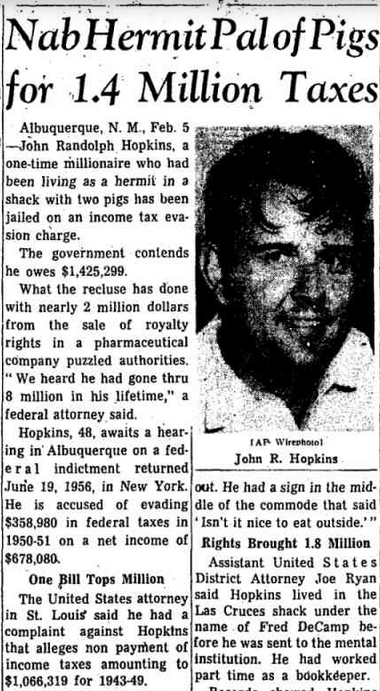
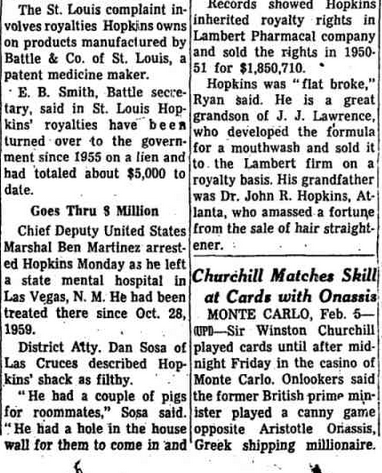
Original story here.
Posted By: Paul - Mon Mar 20, 2017 -
Comments (1)
Category: Animals, Eccentrics, Money, 1960s
Well-known billionaire cashes 13-cent check
Back in 1990, Spy magazine conducted an experiment in "comparative chintziness." Its goal was to find out "Who is America's cheapest zillionaire?" Or, put another way, "how cheap are the rich?"To determine this they sent various rich people each a check for 13 cents, and then waited to see who would actually cash such a tiny check. Two people did: Donald Trump and the Saudi Arabian businessman Adnan Khashoggi.
And yes, they made sure to send the checks to the home addresses of the rich people, and not to their accountants. So that the recipient would have to do a little bit of work to cash the check.
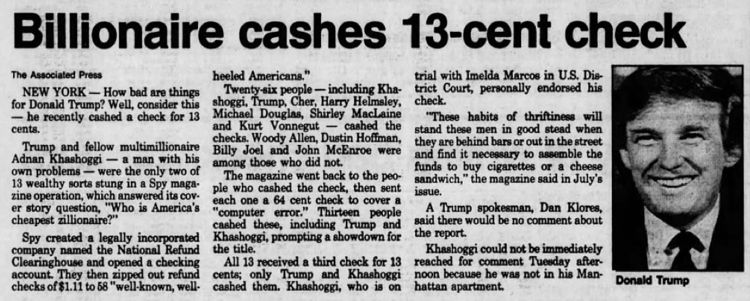
Springfield News-Leader - June 6, 1990
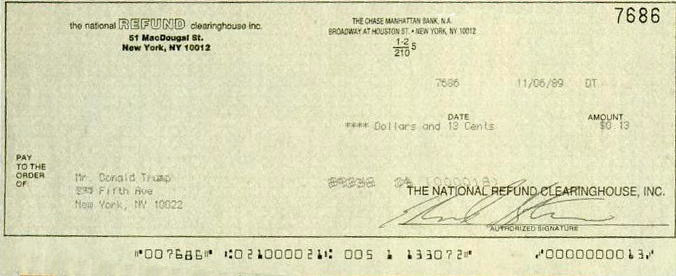
Posted By: Alex - Wed Sep 28, 2016 -
Comments (12)
Category: Money, 1990s
Suddenly hated money
The recurring weird-news theme of people who destroy large amounts of money for various reasons (usually so that their heirs can't get their hands on it).
The Wilmington News Journal - Jan 8, 1963
LONDON — Mrs. Doris Lilian Hawtree, 46, told a magistrate's court yesterday she tore up $700 after a quarrel with her daughter's mother-in-law made her suddenly "hate money."
Posted By: Alex - Fri Aug 05, 2016 -
Comments (2)
Category: Money, 1960s
How to shrink paper money
Dip the bill in liquid ammonia, then let it dry. Repeat this a few times, and you'll end up with a mini-sized bill.Of course, most people don't have liquid ammonia lying around the house. So this is a trick only mad chemists can do.
I'm sure that shrinking a bill would be considered defacement of currency and therefore illegal. However, defaced currency remains legal tender (depending on the degree of defacement), so in theory you could still spend your tiny bill, but it would probably be difficult finding a store willing to accept it.
Posted By: Alex - Wed Jun 22, 2016 -
Comments (6)
Category: Money
Man finds $20 inside cheeseburger
When people find stuff in their food that doesn't belong there, it's usually things like cockroaches, small frogs, rat parts, etc. But when Dave Cook bit into his McDonald's cheeseburger, he found a folded-up $20 bill. He didn't complain to the restaurant about the unusual topping. Instead, he took a picture of the burger, finished it, and then called up the local TV news (WTVR in Virginia) to tell them about it.I don't think a $20 bill is something that would get into a burger by accident. It had to be put there. The question is who put it there: Cook himself or one of the McDonald's employees?

Posted By: Alex - Sun Jun 12, 2016 -
Comments (3)
Category: Food, Junk Food, Money
Allergic to Money
A few cases from the historical record of people who were allergic to money.The obligatory joke in this situation: "I'm not allergic to money, but it's allergic to me."

Medford Mail Tribune - Mar 13, 1953

Arizona Republic - Aug 19, 1954

The Wilmington News Journal - Jan 8, 1963
Posted By: Alex - Thu May 19, 2016 -
Comments (2)
Category: Health, Money
Honor
Not weird, as many of you are well aware, but worth passing on. A day in November is not the only time we should remember to say:
To all of you who served or are serving in the military, thank you for your service. Your sacrifices should never be forgotten.
Posted By: Alex - Fri May 13, 2016 -
Comments (0)
Category: Emotions, Military, Money, Patriotism

| Who We Are |
|---|
| Alex Boese Alex is the creator and curator of the Museum of Hoaxes. He's also the author of various weird, non-fiction, science-themed books such as Elephants on Acid and Psychedelic Apes. Paul Di Filippo Paul has been paid to put weird ideas into fictional form for over thirty years, in his career as a noted science fiction writer. He has recently begun blogging on many curious topics with three fellow writers at The Inferior 4+1. Contact Us |




